All South Indian thalis are not onam sadhyas. A city hotel’s just-launched chef’s guided thali service got us curious enough to dig up recipes and black book contacts that are perfect to introduce you to peninsular food
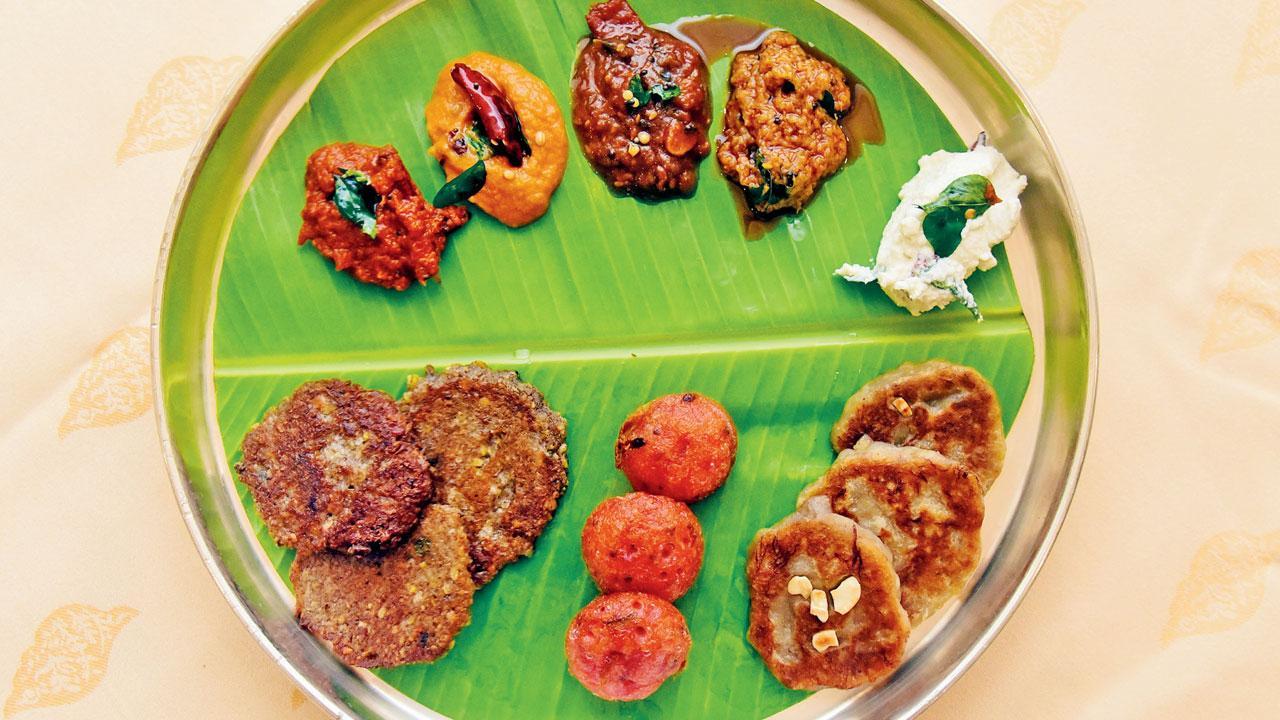
Dakshin Vishesha includes the day’s specials of mini-dosas, vadas, served with five variants of chutneys
In the era of YouTube recipes and social media food posts, it baffles us how some continue to live under a rock and believe that the cuisine of five diverse states can be clubbed under the homogeneous term, South Indian food, or worse, Madrasi fare. The disregard about people and cultures can be bothersome because the cuisine from the south comes closest to sattvic in nature. Influenced by the culinary practices of its regional communities, it is a beautiful coming together of ingredients from peninsular India.
ADVERTISEMENT
Recently, Dakshin Coastal, the restaurant at ITC Maratha in Andheri East reopened, introducing a chef’s special guided dining concept wherein you experience the rhythmic tempo of thali service, alongside explanation by servers on the native origins, taste adaptations and combination eating of each course. These are priced at Rs 2,700-Rs 3,000 plus taxes.
The dakshin immersion begins with a vernacular greeting of “Vanakkam” followed by the gifting of a fragrant jasmine coil. “Reminds you of mallikai or mallipoo, wrapped in banana leaves, sold at the local market in the south, right?” asks Chef Deepti Jadhav, catching us unawares as we take in the aroma before sitting down for a gourmet interactive meal. “The experience blends all food from the five southern states while still maintaining the representation and uniqueness of each.
The idea is not to have an unlimited thali meal where all the dishes are placed on one plate, but to understand the storyline and connection behind each dish and enjoy a sensory meal. In fact, Kerala, Andhra Pradesh, Telangana, and Tamil Nadu can be mapped to a spice level, with Kerala being the least spicy, going up to Andhra where food is the spiciest,” says Jadhav, who has trained under Praveen Anand, the chef instrumental in setting up the original Dakshin in Chennai, 33 years ago.
Starting with sips of neer mor (spiced buttermilk with asafoetida and ginger) to cleanse the palate (we are asked to keep sipping it through the meal to ease digestion), we nibble on the basket of mixed papadams, dipping into five variants of chutneys. We quickly move on to the light bites from Dakshin Vishesha that include the day’s specials of mini-dosas, vadas, the famed banana dosa which has subtle hints of ginger (helps with digestion), vadai (crisp lentil dumpling), padpe upkari (seasonal greens with onion and coconut shavings), ananas mensakai (pineapple curry made with chilli and coconut), served with iddiappam or appam. Jadhav points out how pairings are crucial and while certain chutneys are recommended, the guest is encouraged to taste and assess what pairings suit them best.
Telangana and Andhra Thali
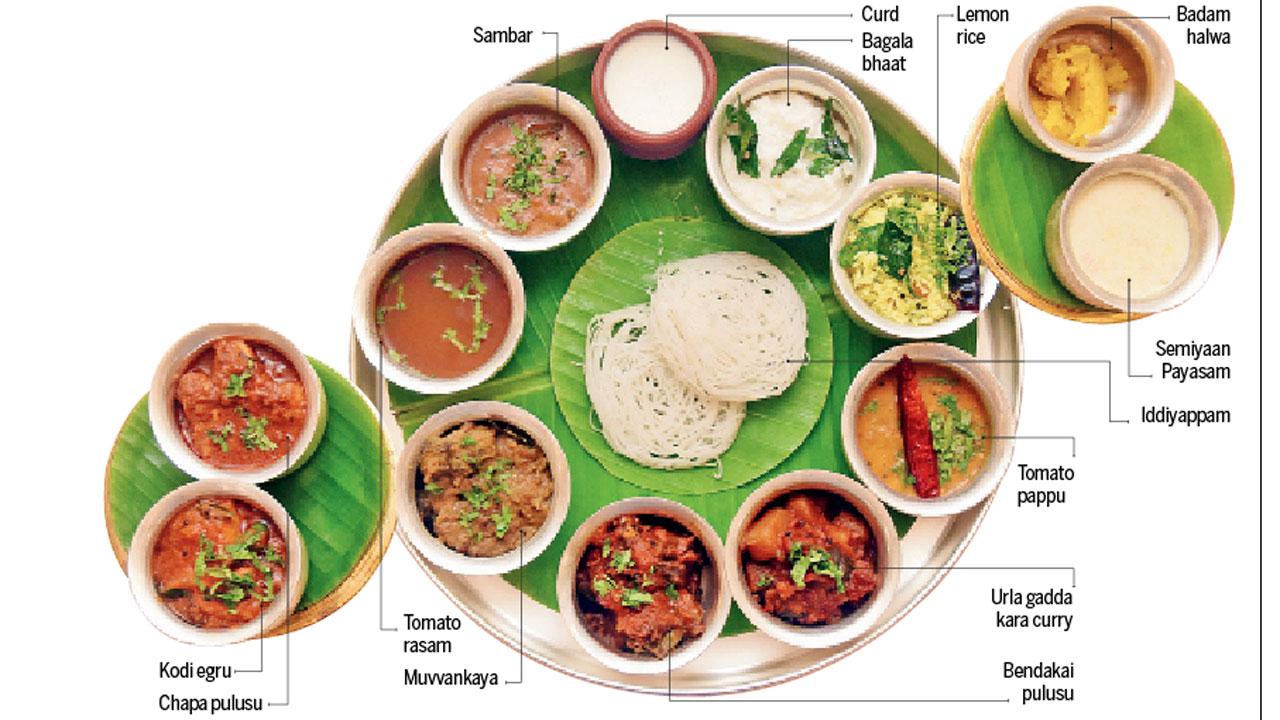
Comparing notes with the Andhra and Telangana thalis, Jadhav tells us how these bio-diverse sister states are divided into three culinary zones—coastal Andhra, Rayalaseema and Telangana. The semi-arid Telangana sees the popularity of millet-based bread (roti), whereas rice is predominant in coastal Andhra and Rayalaseema regions. Here, most curries (called koora), snacks, and sweets vary in the method of preparation and differ in name, too. “Andhra cooking has certain unique characteristics that set it apart. The sour-tangy taste notes come from tamarind. Guntur chilli, famous for its heat and pungency, grows here and the cuisine features it often among other spices that are used in a symphony to carefully balance the gradual titillation of the palate. Freshly grated coconut or coconut milk is added to the gravies to balance out the pungency. One of the quintessential dishes is pappu or dal [of thick consistency made with native herbs and spices]. There are some signature stews such as the pulusu. Eggplant is a favoured ingredient, often used in everything from koora to pachadi,” says Jadhav.
The bendakaya pulusu is okra in a tangy-fiery curry, while the muv vankaya has slow-cooked baby aubergines in a paste of coconut, poppy seeds, and cashew paste, much like the Bengali poshto and is served with iddiappam and appam. The tomato pappu (lentils cooked with tomatoes, onions, and chillies, tempered with garlic and mustard) and urlagadda kara curry (potatoes tossed with onion and chillies), served with veechu paratha and kal dosai had us off to a good start. The non-vegetarian thali variant includes Telangana kodi roast (spicy morsels of chicken with onion and green chilli), chapa pulusu (spicy and tangy gravy of fish), kodi egru (spicy chicken masala) served with veechu paratha and kal dosai. A rice dish called nimmakaya chitrannam sees rice tossed with lemon juice, ginger, green chilli, and tempered with mustard. Its mild zesty flavours are heart-warming. For dessert, the thali offers the simple semiya payasam and badam halwa.
Karnataka thali
Karnataka’s topographic and climatic diversity divides the state into four culinary zones—coastal Karnataka, old Mysore (plains), Malnad (hills) and north Karnataka (plateau). The northern part, with its proximity to Maharashtra and Goa, is impacted by the adjoining states’ culinary traditions. “Think buns and curries infused with vinegar or jolada rotis [jowar flatbread] that are a staple with akki rottis [rice flatbread],” explains Jadhav.
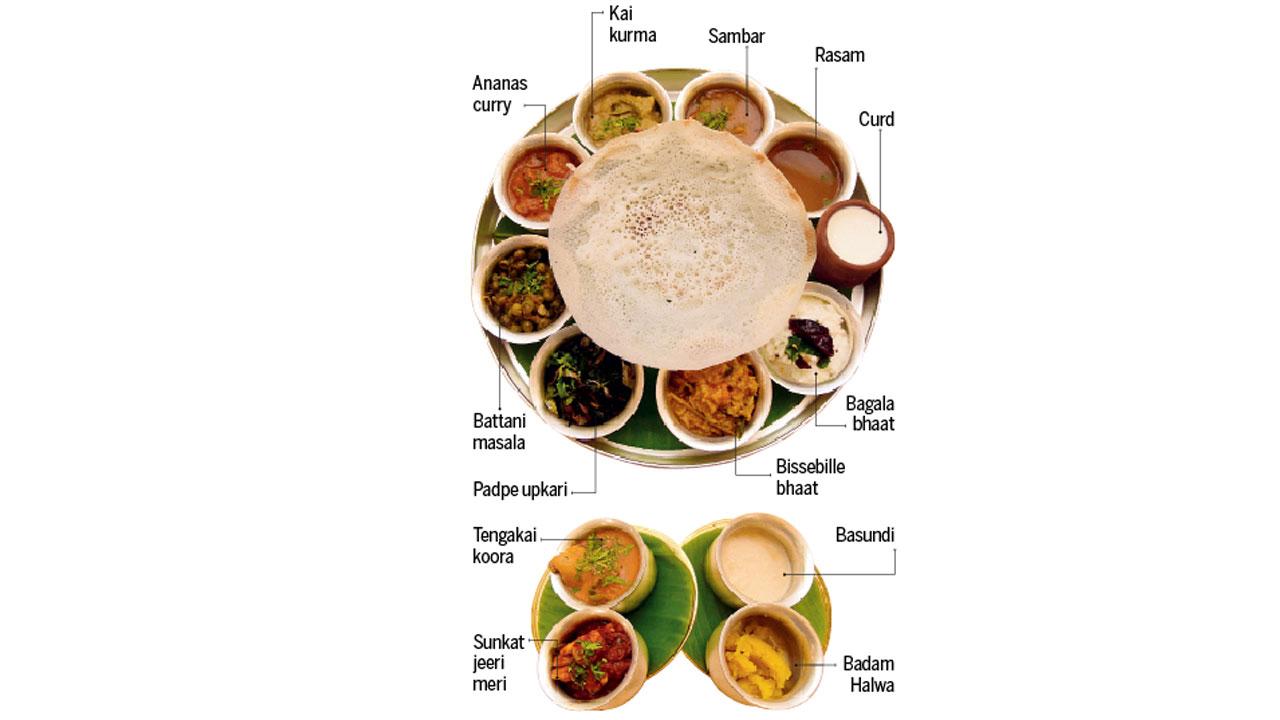
The Malnad region is known for its bamboo, banana, and yam-based preparations. The vegetarian meals from the temple towns of Gokarna and Udupi are now famed globally. The Udipi brahmins and Iyengars are vegetarians, the Bunts and the Shettys savour non-vegetarian delicacies, the Saraswat Brahmins love seafood, and in Coorg, you will find spicy pork curry and coffee. Go southward, and ragi is considered a staple. Jadhav tells us how barring Northern Karnataka cuisine which is spicy, the liberal use of ghee, palm sugar, jaggery, and seasonal vegetables and fruits in main curries make the dishes of the region less spicy as compared to Andhra or Tamil fare.
Next, the kai kurmah (vegetables simmered in a gravy of coconut, poppy seeds and spices), battani masala (green peas in a masala of onion, tomatoes, red chillies, and coconut) is served with veechu paratha and kal dosai. The non-vegetarian variant includes meen kaidina (semolina and byadgi chilli coated fried fish), sunkat jeeri meeri (prawns tossed in onions, byadgi chillies and vinegar with hints of cumin) and thengenkai kori (chicken simmered in a mildly spiced coconut gravy).
Of course, there is sambar, rasam and curd—staples of a South Indian thali. For the rice course, there is bagala bhath (curd rice) and bisi bele bhath and fragrant steamed rice that goes beautifully with a few drops of ghee.
For sweets, there was basundi and saffron-infused badam halwa that Jadhav mentions is common across states and takes hours to cook, but is the perfect ending to a dreamy Karnataka thali.
Andhra special, Gongura biryani by Sravani Mellacheruvu
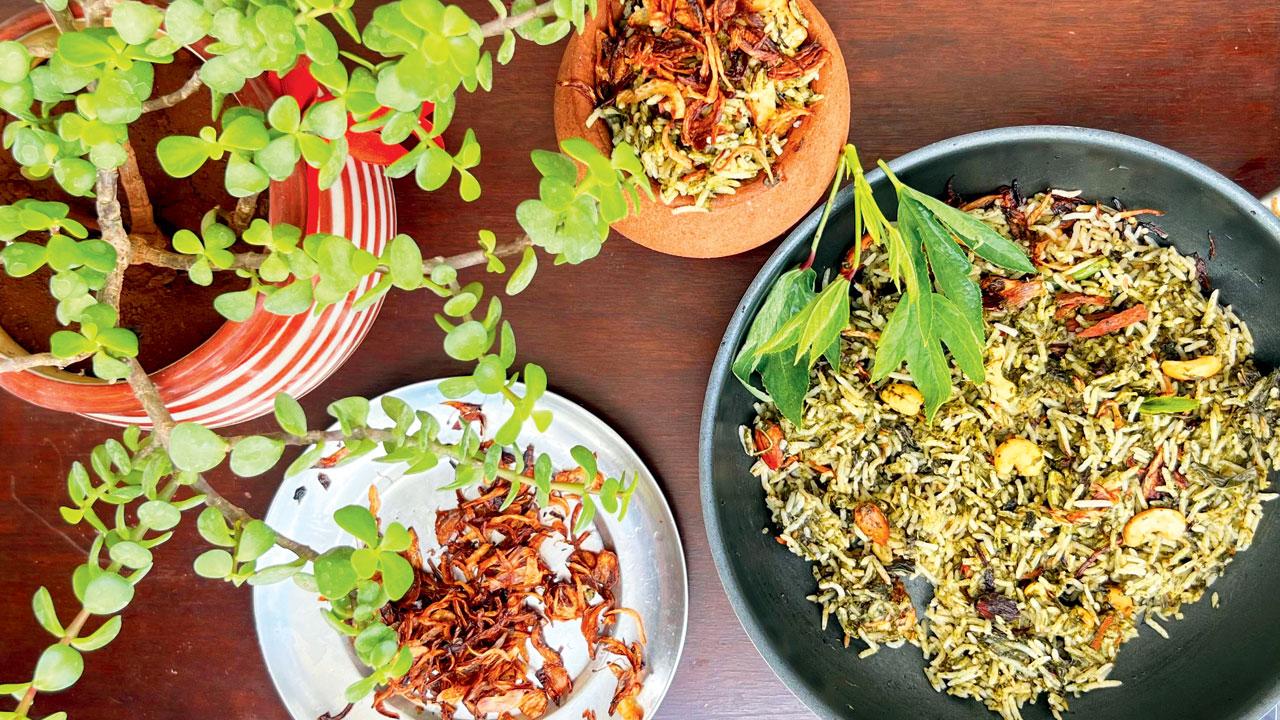
Gongura (hibiscus sabdariffa), a super hit Andhra favourite ingredient, is an excellent source of folate and Vitamin B6. Biryani made of gongura has a strong taste and is considered healthy too.
Method:
Soak 1 cup seeraga rice for an hour; cut a cup of onion, carrots, eggplant and potatoes into cubes. In a pot, add 2 tbsp oil, then add ½ cup gongura leaves, ¼ of the onions and green chillies. Close the lid and cook until soft. Let it cool and grind to a paste. Boil
4 ½ cups of water, add bay leaf and cook rice. Keep aside. Take a pan, add some ghee, cumin, star anise, cinnamon, and fry till golden brown. Add veggies and cook covered for 10 minutes. Now add gongura paste, chilli powder and coriander powder, and cook for five minutes. In a large pot, layer the gongura mixture and rice. Seal with aluminium foil and cook on very low flame for 20-30 minutes. Mix well, garnish with cilantro. Serve hot immediately.
Karnataka special, Chicken ghee roast by Sravani Mellacheruvu
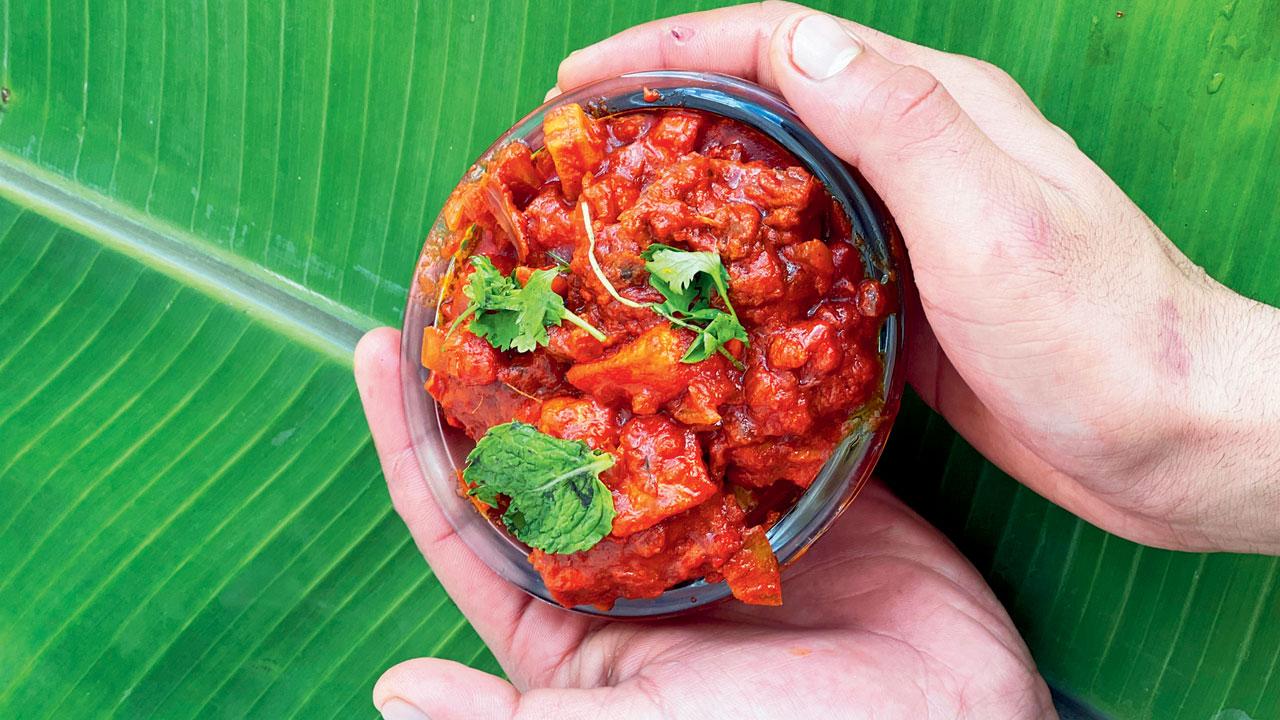
This fiercely popular Mangalorean chicken recipe has its origins in Kundapur close to Udupi. Spicy, just as it is tangy, it has a robust flavour imparted by spices and ghee.
Method:
In a mixing bowl, mix a cup of curd, 1/4 tsp turmeric and one lemon juice and marinate chicken for an hour. Dry roast 8 dried red chilies, 1/2 tbsp fenugreek seeds, 1 tsp cumin seeds, 1 tsp coriander seeds, a few cloves and peppercorns. Cool and make a paste along with 12 cloves garlic and a small bolb of tamarind. In a wok, heat ghee, add curry leaves and marinated chicken. Add the masala and cook until the ghee separates. Add some jaggery, salt and mix well. Serve with Kanchipuram or chiblu idlis or dosas.
Feels like home
The South Social
This latest cloud kitchen in Bandra by Sravani Mellacheruvu brings the authentic taste of South India to Mumbai. You’ll find some interesting traditional Andhra dishes such as Gongura and Mangalorian ones such as Chicken Ghee roast that are not commonly available on other South Indian menus. They provide daily meal service and private catering as well.
CALL: 8976198832
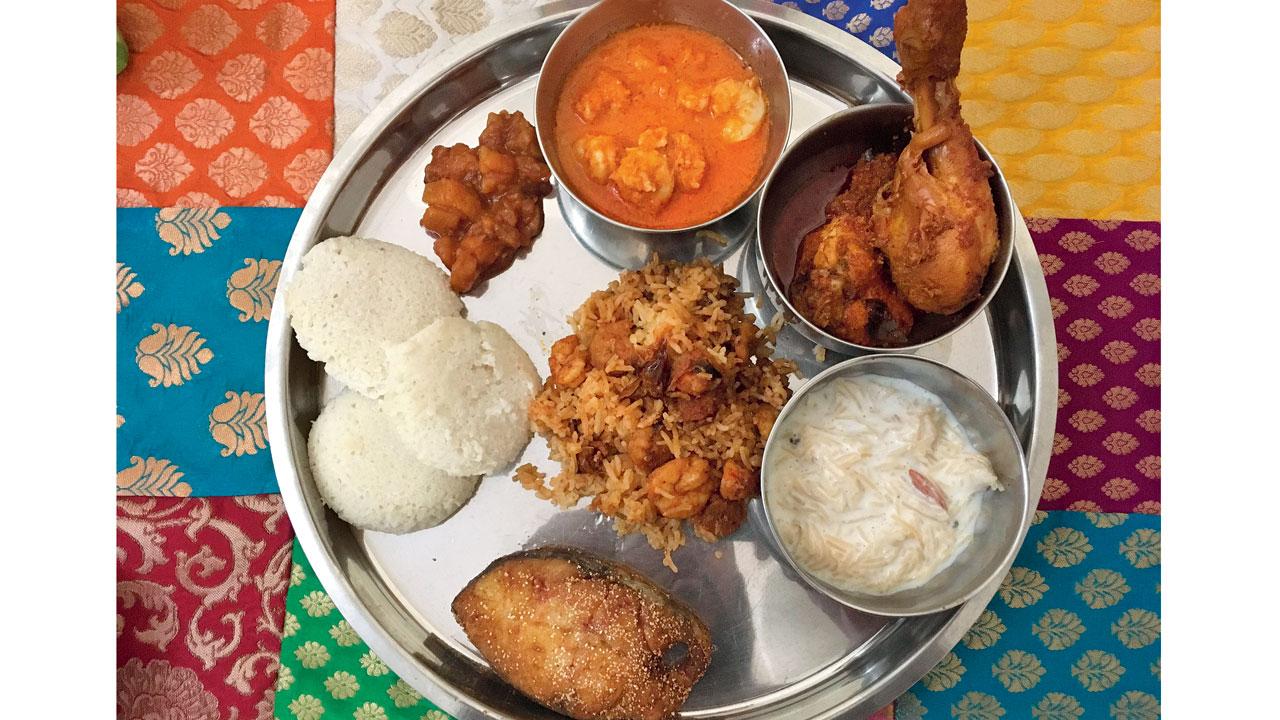
Prabha Kini
Pre-COVID, homechef Prabha Kini welcomed guests to try a typical GSB (Gaud Saraswat Brahmin) thali at her home in Santa Cruz. Now you can order it online. It includes rice, dalitoy, tender cashew tondli, chana ghashi, jackfruit (chakko), thotta idli, achar, mangane (lentil paysam), phodis (fritters of breadfruit, sweet potato, potato, etc), kori roti, chicken ghee roast, and chicken sukka.
CALL: 9820884070
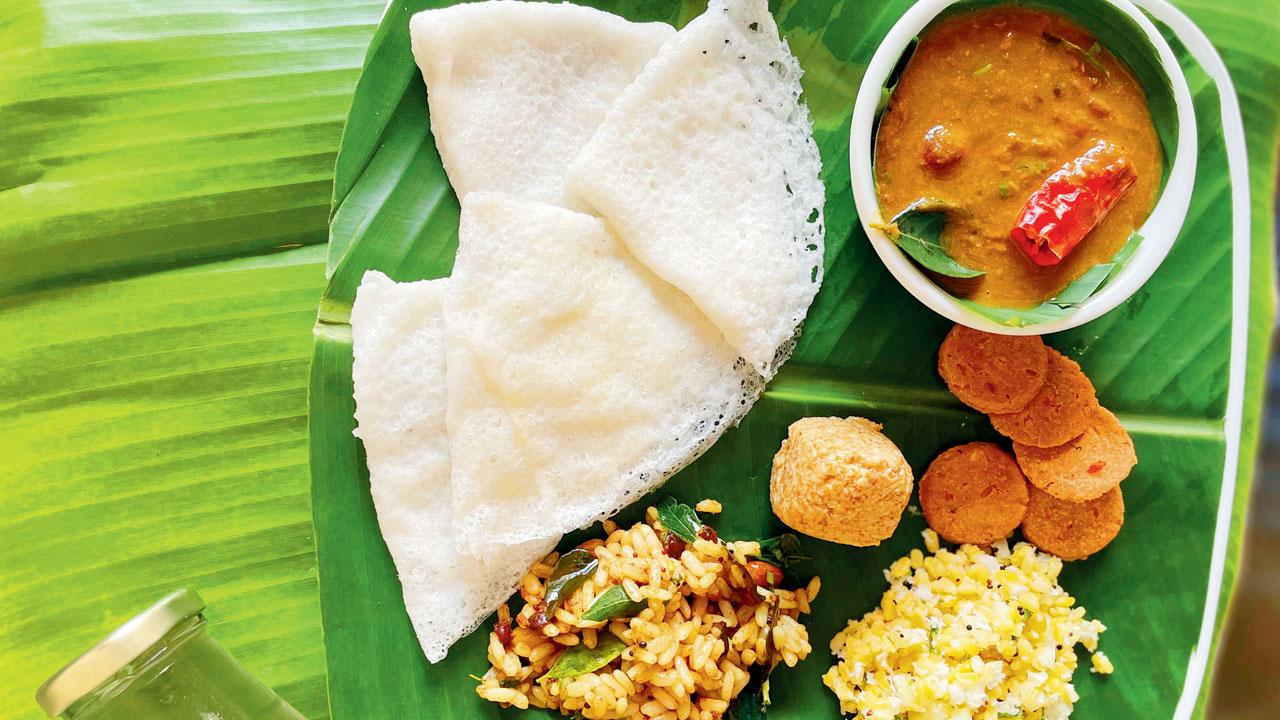
Sadaam
Saadam is a health-conscious brand by Chef Pooja Naheta that excels in authentic South Indian cuisine, with special Andhra and Karnataka courses that are vegan, sugarfree, and gluten-free. Do try their dum biryani, mirchi ka salan, pesarattu dosa in the Andhra selection and Nipattu, piloyodhari, and kaju-jaggery laddu in the Karnataka selection.
CALL: 9867380078
 Subscribe today by clicking the link and stay updated with the latest news!" Click here!
Subscribe today by clicking the link and stay updated with the latest news!" Click here!








